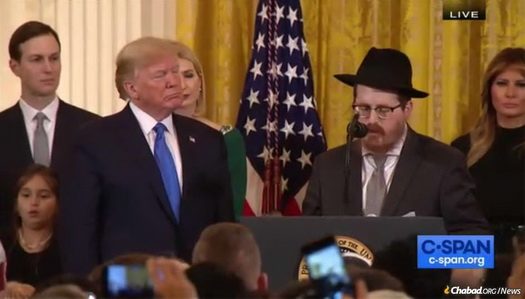by Yehuda Sugar – chabad.org
Acknowledging the Jewish people’s “resilience, endurance and faith” at the annual White House Chanukah reception and symbolic menorah lighting, President Donald Trump publicly recognized the work of two Chassidic activists who were instrumental in spearheading the First Step Act, the most sweeping package of criminal justice in a generation. The bill was passed with overwhelming bi-partisan support, and the President signed it into law a little less than a year ago.
Speaking about the First Step Act, the President noted the foresight and leadership of a small group of devoted Jewish community activists led by Rabbi Moshe Margareten, a member of the Skverer Chassidic group and director of the Tzedek Association, who spent years working on various iterations of the bill. Throughout, they were aided by the passion, support and expertise of Chabad-Lubavitch’s Aleph Institute, the leading Jewish organization caring for the incarcerated and their families. At the White House, Trump invited Rabbi Zvi Boyarsky, Aleph’s director of constitutional advocacy, to address the assembled.
Boyarsky requested that the audience join him in a short prayer in honor of the victims killed in Tuesday’s anti-Semitic attack on a kosher grocery storein Jersey City, N.J., and recited the Shema Yisroel prayer, a cornerstone affirmation of the Jewish people’s faith in G?d.
Speaking about the unprecedented measure, Boyarsky shared how it resulted from the pioneering teachings of the Rebbe, Rabbi Menachem M. Schneerson, of righteous memory, who spoke about the flaws of incarceration divorced of rehabilitation as early as 1950. Indeed, it was at the Rebbe’s behest that in 1981 Rabbi Sholom Lipskar founded the Aleph Institute, which has ever since been a leading voice for sentencing alternatives to incarceration and other fundamental reforms.
“The Rebbe advocated that through good behavior and participating in educational programs, demonstrating remorse and the will to lead a life of honesty and integrity, prisoners should be able to earn reduced sentences and the ability to contribute goodness to the world,” Boyarsky told the crowd of elected officials, rabbis, business leaders and Jewish activists gathered in the White House for the reception.
“Mr. President,” he continued, “through the monumental First Step Act, you have helped countless worthy individuals reach their potential and share their unique divine light with the world.”
Respect for the innate humanity of each and every individual, as well as their ability and responsibility to fulfill their life’s purpose lies at the heart of the Rebbe’s views on criminal justice. Among the specific reforms, the bill—which was championed within the White House by the President’s son-in-law and advisor, Jared Kushner— provides for expanded opportunities for early transfer to home confinement via participation in job training and re-entry programming designed to reduce recidivism; modifies some mandatory sentencing laws; and ensures that the incarcerated stay more closely connected to their families by placing them within 500 miles of their homes. Crucially, the bill also banned the shackling of pregnant and postpartum women. Drawing national praise and acclaim, the measure has the potential to positively impact the lives of all federal prisoners.
Created in the Image of G?d
“If a person is being held in prison, the goal should not be punishment but rather to give him the chance to reflect on the undesirable actions for which he was incarcerated, improve himself and prepare for his release when he will commence an honest, peaceful, new life, having used his days in prison toward this end,” explained the Rebbe in a 1976 talk on the subject.
“In order for this to be a reality, a prisoner must be allowed to maintain a sense that he is created in the image of God; he is a human being who can be a reflection of Godliness in this world. But when a prisoner is denied this sense and feels subjugated and controlled; never allowed to raise up his head, then the prison system not only fails at its purpose, it creates in him a greater criminal than there was before. One of the goals of the prison system is to help Jewish inmates and non-Jewish inmates … to raise up their spirits and to encourage them, providing the sense, to the degree possible, that they are just as human as those that are free; just as human as the prison guards. In this way they can be empowered to improve themselves … ”
At the White House,Margareten symbolically lit a menorah in honor of the upcoming Chanukah holiday, which begins Sunday night, December 22.
After inviting Boyarksy to speak and Margareten to light the menorah, Trump said, “Rabbi Moshe and Rabbi Zvi, we salute your leadership and we thank you very much for the job you did.”
In the spirit of the upcoming festival, Trump also recounted the main miracle of the Chanukah story, the discovery of a cruse of oil enough for only one day to rededicate the Temple that lasted for eight.
Trump said the story is a “reminder of the Jewish people’s resilience, endurance and faith. For centuries, the Jewish people have endured violence and oppression beyond measure,” he said. “But no cruelty can overcome the spirit and no destruction can crush the eternal strength of your resolve.”







